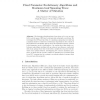Free Online Productivity Tools
i2Speak
i2Symbol
i2OCR
iTex2Img
iWeb2Print
iWeb2Shot
i2Type
iPdf2Split
iPdf2Merge
i2Bopomofo
i2Arabic
i2Style
i2Image
i2PDF
iLatex2Rtf
Sci2ools
125
click to vote
PPSN
2010
Springer
2010
Springer
Fixed Parameter Evolutionary Algorithms and Maximum Leaf Spanning Trees: A Matter of Mutation
Abstract. Evolutionary algorithms have been shown to be very successful for a wide range of NP-hard combinatorial optimization problems. We investigate the NP-hard problem of computing a spanning tree that has a maximal number of leaves by evolutionary algorithms in the context of fixed parameter tractability (FPT) where the maximum number of leaves is the parameter under consideration. Our results show that simple evolutionary algorithms working with an edge-set encoding are confronted with local optima whose size of the inferior neighborhood grows with the value of an optimal solution. Investigating two common mutation operators, we show that an operator related to spanning tree problems leads to an FPT running time in contrast to a general mutation operator that does not have this property.
Distributed And Parallel Computing | Evolutionary Algorithms | Mutation Operator | PPSN 2010 | Spanning Tree |
| Added | 29 Jan 2011 |
| Updated | 29 Jan 2011 |
| Type | Journal |
| Year | 2010 |
| Where | PPSN |
| Authors | Stefan Kratsch, Per Kristian Lehre, Frank Neumann, Pietro Simone Oliveto |
Comments (0)

